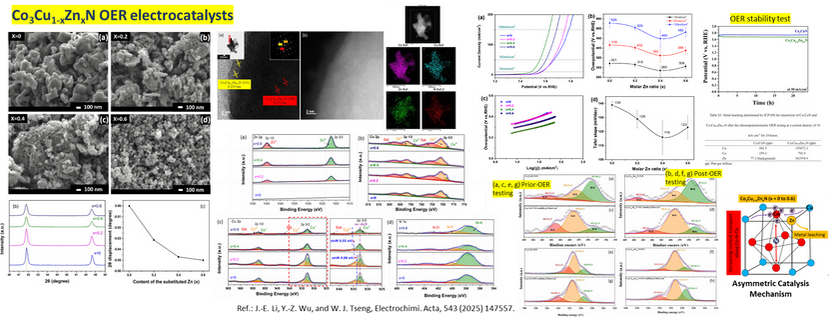
奈 米 粉 體 材 料 實 驗 室
-
Surface decoration of semiconducting nanomaterials for selective gas sensing.
Water poisoning remains as a challenging issue for semiconducting metal oxide (SMO) chemiresistor gas-sensors.


Semiconducting heterostructure and morphological control for humidity-tolerable chemiresistor gas-sensors.


零維CuO修飾一維V2O5階層化奈米複合材之(a) SEM、(b) TEM微結構、(c)針對23 ppm濃度之H2S氣體的選擇性氣體感測;及(d)異質CuO/V2O5介面的能帶圖與電流於奈米線及其接點間的傳遞示意圖、(e)對23 ppm濃度H2S氣體之長效感測能力。
2. Transitional-metal nitride ceramic catalysts with anti-Perovskite structure for clean-energy electrocatalysis/photo-electrocatalysis and selective removal of organic dyes in wastewater.


3. Chemical synthesis, surface modification of functional low-dimensional nanohybrids for photoelectrochemical clean energy, CO2 conversion, and the adsorption and removal of organic dyes in wastewater treatment.
The “interior” provides:
i)Specific functionality (e.g., magnetic response, luminescence, etc.)
ii)Confined cavity size for tailored functionality
iii) Release thru the meso-channel

The “shell” provides:
i)Protection to the interior
ii)Enabling interaction thru tunable surface meso-structure
iii) Specific functionality (e.g., chemical, biological, PEC, sensing, etc.)
Rattling Ag@TiO2
Fe3O4@Ag@TiO2
Fe3O4@Ag@TiO2-xNx

Ref.: W. J. Tseng, Y.-C. Chuang, and Y.-A. Chen, Adv. Powder Technol. 29 (2018) 664-671.
Ref.: W. J. Tseng, C.-C. Cheng, and J. H. Hsieh, J. Am. Ceram. Soc. 97 [2] (2014) 407-412.
Ref.: Y.-H. Lin and W. J. Tseng, Ceram. Int. 48 (2022) 13906-13913.
Nitridation of the TiO2 to become TiO2-xNx shell for visible-light photocatalysis.
Conceptual Drawing